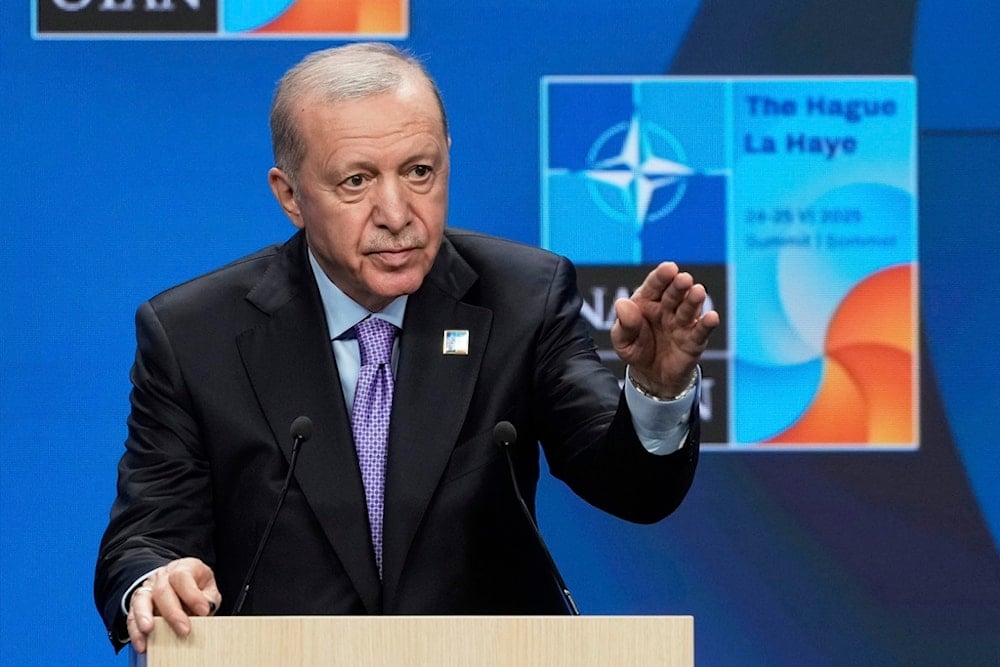Report questions Turkey’s role in future European defense plans
A new report warns Europe’s defense remains fragmented and questions whether Turkey can be trusted to join the EU’s emerging security architecture.
-

Turkish President Recep Tayyip Erdogan gestures during a press conference after the plenary session at the NATO summit in The Hague, Netherlands, Wednesday, June 25, 2025 (AP)
A recent in-depth analysis by Robert Ellis for The National Interest has spotlighted the European Union’s precarious geopolitical balancing act between an assertive Russia and a retreating, protectionist United States under Donald Trump. The report, which tackles Europe’s defense shortcomings and its dependence on both American hardware and internal cohesion, raises tough questions about the bloc’s preparedness and whether Turkey can or should be part of its evolving security architecture.
Citing Autocracy, Inc. by journalist Anne Applebaum, the report frames the Ukraine war not simply as a territorial conflict but as a direct confrontation over the future of the world order. This framing, echoed by top Russian officials and amplified by Trump’s inner circle, is pushing Europe toward what the report describes as a reluctant militarization after decades of reliance on “the peace dividend.”
The analysis traces a string of political and defense developments across the continent, highlighting Trump-era challenges such as the April 2 tariff blitz and Vice President JD Vance’s pointed remarks at the Munich Security Conference. In response, the European Union has put forward ambitious financial instruments, namely the €800 billion Readiness 2030 initiative and the €150 billion SAFE fund, but experts cited in the report suggest that funding alone won’t fix Europe’s fragmented command structure or procurement bottlenecks.
EU short of having a deterrent
A stark February forecast by the Brussels-based Bruegel think tank is cited, warning that the EU would need 300,000 additional troops and an extra €250 billion per year just to mount a credible deterrent, The National Interest said. The report criticizes Europe’s lack of unified military command and suggests that national forces, though numerous, are inefficient when dispersed across 29 armies with no integrated system.
Defense scholars Can Kasapoglu and Peter Rough are referenced in arguing that Europe’s “strategic autonomy” is illusory without deep access to the US defense-industrial base, a point reinforced by the logistical gaps that persist across the continent. The report points out that even high-alert states like Poland and the Baltic nations are not enough to compensate for structural weaknesses elsewhere; for instance, Denmark is reportedly unable to field a single combat-ready brigade.
Amid this reality, the report outlines Europe’s turn toward bilateral and trilateral agreements as a workaround. It highlights the Northwood Declaration between the UK and France as a renewal of nuclear and strategic cooperation, and the Kensington Treaty between London and Berlin as an effort to anchor a new tripartite security core.
An opportunity, or a liability?
Turkey emerges in the report as both an opportunity and a liability. Turkish Foreign Minister Hakan Fidan's overtures at a London summit, and Ankara’s potential interest in tapping into the EU’s SAFE fund, are seen as pragmatic moves tied to Turkey’s growing defense manufacturing capacity. However, the National Interest report makes clear that EU acceptance of Turkey remains deeply contentious, especially given requirements for unanimous approval and the prohibition of participation by states deemed threatening to EU interests.
The report details lingering anxieties over President Recep Tayyip Erdogan’s domestic and foreign policies, particularly the suppression of secular opposition, the aggressive Blue Homeland maritime doctrine, and prior threats against Greece and Cyprus. Even as Ankara finalizes arms deals with the US (including the sale of 40 F-16s) and wins support from the UK and Germany for a Eurofighter Typhoon acquisition, the analysis underscores European skepticism over trusting Erdogan’s long-term motives.
French President Emmanuel Macron’s previous warnings, citing Turkey alongside Russia and China as authoritarian threats to Europe, are also invoked, especially in light of recent political instability in Ankara and the rumored resignation of Finance Minister Mehmet Simsek.
Ultimately, the report does not offer a definitive stance but frames Turkey’s position as a litmus test for the broader coherence and credibility of Europe’s future defense identity. As one of the continent’s few militarily capable non-EU states, Turkey represents a paradox: indispensable in some respects, yet incompatible in others.

 4 Min Read
4 Min Read










